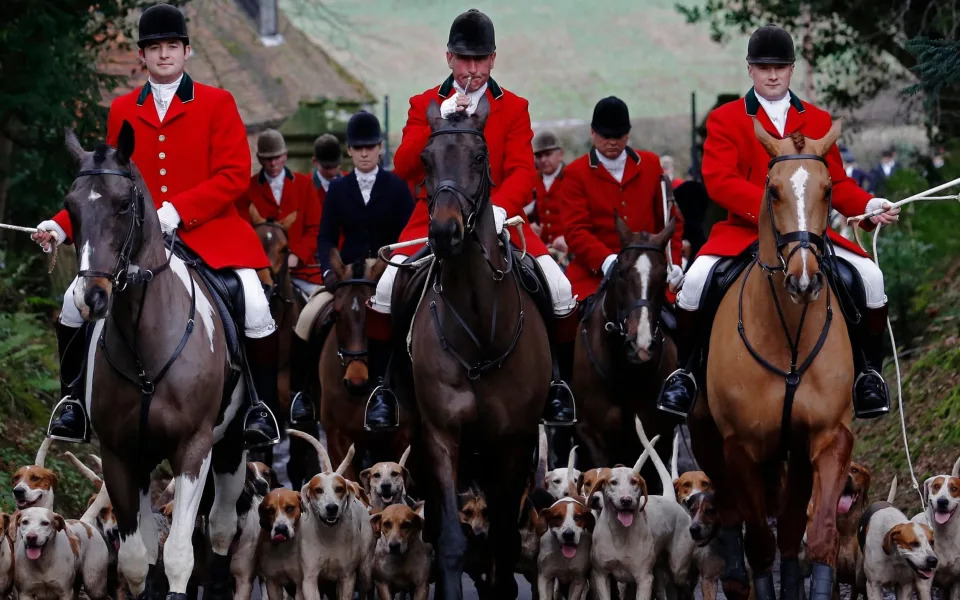You can always tell when the hunts are desperate to continue their 'sport' and I think this says a great deal about the corruption going on.
Fox populations have plummeted in the wake of the 2004 Hunting Act, vets have warned as they called for the Government to launch a scientific review into population control.
More than 100 vets have written to ministers warning that “despite decades of intense debate”, there is no research that backs up the arguments on the most “humane way to control fox numbers”.
A scientific review was needed, they said, as numbers have plummeted since the 2004 ban and red foxes were approaching extinction in some rural areas.
This was because landowners have resorted to shooting foxes to control the population, killing some of the fittest animals and vixens with cubs, which is “contrary to good conservation practice”, the vets said.
“Advocates of the 2004 ban on hunting would not have expected their efforts to protect foxes to result in this catastrophic decline,” the letter added.
It was signed by 103 vets from across the UK, led by Louisa Cheape, a vet who also sits on the committee of The Veterinary Association for Wildlife Management.
The letter noted that all major landowners, including the Royal Society for the Protection of Birds, accepted that fox numbers had to be controlled.
Driven by moral outrage
Daniel Greenberg, the barrister who drafted the 2004 Hunting Act, had raised concerns that the law was driven by “moral outrage” rather than concerns for animal welfare, the Telegraph reported.
The Burns Inquiry, which was set up to examine the facts before the ban was introduced, concluded there was “very little by way of scientific evidence” about the best method of control, while a similar report for the Scottish Government said the evidence was “inconclusive”.
The vets said there was little evidence on which methods caused foxes the least harm and noted the Burns Report found “the welfare of foxes... could be affected adversely unless dogs could be used”.
The letter continued: “Compounding the need for research is the decline in rural fox numbers since the hunting ban was introduced.
“The 35 per cent fall in the overall fox population over the last 10 years masks the extent of the even sharper fall in rural fox numbers, because there has been a rapid rise in urban fox numbers.
“In some parts of the countryside, red foxes are approaching extinction. Environmentalists believe they should be considered ‘a species of conservation concern’.”
Developments in technology such as thermal scopes “combined with a tougher zero tolerance attitude among land managers is behind the plunge in rural fox populations”, the letter said.
The vets suggested “the most humane method of controlling fox numbers should be based on selection for the weakest animals, minimising the possibility of wounding and preventing the orphaning of dependent young.
“Perversely, hunting with hounds was much better at achieving this than any of today’s legal methods.”
The number of foxes killed in hunts was limited and the hunt dispersed the foxes that survived from sensitive areas, the vets added.
“This issue is urgent because the welfare of foxes - as a species and as individuals - is being badly compromised. Environment departments must ensure this is assessed scientifically, away from the noise generated by political campaigners,” they said.
“It is dispiriting that two decades ago, the debates on fox hunting were driven overwhelmingly by political instincts, and the need for scientific research was scarcely considered.
“Today’s politicians need to recognise that the Hunting Act has failed to gain acceptance among rural communities. Both sides are taking matters into their own hands - respect for the law has diminished. The starting point for healing these divisions would be commissioning high-quality academic research on which future legislation could be built.”
The environment department declined to comment when approached by the Telegraph.
Westminster must listen to farmers, not armchair experts
By Rachel Emma Manners, the Duchess of Rutland
I am an accidental Duchess. Before my marriage, I was raised as a Welsh sheep farmer’s daughter.
Our pride and joy was Sidney, our sheepdog, who was wonderful at rounding up our flock, but tragically he sometimes attacked them. My father found him with blood on his mouth just before lambing. He had killed two ewes and their twins. These six sheep were our livelihood and so my father shot our beloved Sidney.
For farmers, the predatory attacks of dogs and foxes are very difficult to control. There are no easy answers. Yet, far too often, our politicians plunge feet-first and make things far worse.
Take foxes. There are many people in the countryside who remain convinced that hunting was a balanced approach to keeping their numbers down - and at least as many others who just as firmly disagree. The remarkable thing is that for all their sound and fury, politicians never commissioned research on whether snaring, shooting or hunting is the most humane way.
So I am delighted that 103 vets are today calling for scientific analysis into the way fox numbers are managed.
Shooting has a high wounding rate
Snaring foxes is not without its problems. Non-target species like badgers can be inadvertently trapped and it is harrowing for wild animals to be constrained.
Shooting is the most common way of killing foxes. The big problem is that because foxes are small, agile and often shot at a distance, wounding rates can be high. Last month, the Telegraph revealed that when the RSPB’s contractors wound foxes, the charity allows them to use dogs to pursue and finish them off.
Modern thermal scopes have made shooting more popular, and the vets report in their letter that in some areas rural fox populations have fallen so much that they are “approaching extinction”.
A key issue with any method is how quick the animal dies. The official Burns Report said that with packs of dogs the fox nearly always dies in just “a few seconds”.
Research could also study another alternative, which is to never cull foxes. Yet ground-nesting waders like curlew, lapwing and oystercatchers are bouncing back because fox numbers are being controlled. Black game is also surging. Ending fox control would also result in even more chickens and lambs meeting a grisly end.
Huge problem with dog attacks
This leads me back to my childhood memories of my father regularly having to shoot dogs to protect his sheep. Modern Wales has a huge problem with dog attacks. The Telegraph has reported that Welsh sheep farmers suffer four times more attacks and shoot three times more dogs than their counterparts in the rest of the UK.
Why is there such a huge problem in Wales? Last year, 100 farmers, including Gareth Wyn Jones, suggested it was because the country banned the training of dogs with e-collars in 2010. They pointed to the large volume of research showing these collars are very effective at making dogs wary of approaching sheep. That is important because dogs are forever escaping from their owners.
In Scotland, they recently raised the fine for owners who do not keep their dogs on leads to £40,000 and that has not solved the problem. Why? Because the biggest problem is training the dogs, not the owners.
Why ban what works?
The National Sheep Association says bans on e-collar training are “utterly irresponsible”, so guess what the environment department in England has just promised to do? Ban them as well.
Hundreds of thousands of responsible owners use these devices to train their dogs because they do not want farmers shooting them. They believe a short startle is far better than being shot. And, for the record, the shock from e-collars is 3,000 times less powerful than some livestock fences.
Yet the most shocking thing about this matter is that Thérèse Coffey, the Environment Secretary behind this latest attempt to ban e-collar training, used one on her own dog. She has some explaining to do.
Westminster has to stop ignoring farmers. We are custodians - practical people who have managed the balance of nature over the centuries. Both sides of my family have been farming the Welsh Marches since the time of Charles I. It is in our DNA.
We respect the role of all species, yet the armchair experts of London cannot stop interfering. They lack knowledge, they lack science, and they are creating impossible pressures on country people and animals.










No comments:
Post a Comment